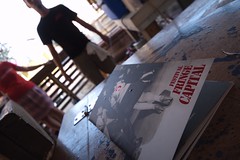I’m reviewing eight plays over eight days for the 2010 Capital Fringe Festival, in collaboration with DC Theatre Scene. Get your button and join me!
If you want to know why Greek tragedy is still vital to modern theater, go see paperStrangers Performance Group’s adaptation of Medea. Striking use of movement and multimedia combine to bring very intense moments of madness to life. Director Michael Burke has a fascinating vision, unified throughout all the major design elements he also helmed – lighting, video, sound and costumes – creating a sometimes strident but brutally beautiful work, like Medea herself.
“A woman’s likely to get emotional when her husband marries again,” understates Jason (of the Argonauts, if you are keeping mythological score). He owes a huge debt to Medea, who murdered her own brother and many others to assist Jason in his quest for the Golden Fleece. She bears him two children, and expects to reign as his queen despite her barbarian background. But love is a luxury for heroes – he puts her aside for a more royal bride, and more insults to follow, with the bride’s father wanting her banished.
This is where we meet them, at the moment the ultimate bridezilla is dumped in her swan feathered bridal gown, her voiceless screams of rage fracturing the space, a creepily twisted chorus shuffling in to reveal her inner turmoil.
It’s powerful stuff, delivered balls-to-the-wall by a cast not afraid to take risks. Melissa Fenton has Medea’s vengeance down to the sinews, a brave and intelligent performance. I’ve often thought Medea isn’t really the portrait of a woman scorned but the human embodiment of a Fury, exacting the gods’ justice on earth. There’s potential audience alienation in her portrayal, but that’s fitting for the Greeks – we aren’t meant to like these people as much as learn from their mistakes. Kellen York as Jason nails that annoying charisma of a pragmatic player – like Medea, you don’t know whether to kiss him or to hit him. And the chorus, with their warped physicality and broken doll faces, add to a perverted sense of ancient justice.
“Bad temper means trouble,” Jason also says of his willful wife. Did the playwright Euripedes mean for us to sympathize with her or not? Her final act of vengeance, ripping apart her children (simply but sickeningly done here with red feathers) is anathema and yet, does Jason bring it upon himself by jilting the granddaughter of the sun? Through the constant musical background emoting the painful depths of her loss, matched by the physical and vocal intensity, it’s hard not to be moved to side with Medea.
That is, unless you’re the second bride.


